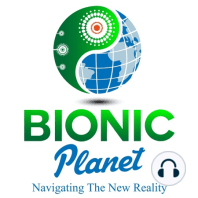58 min listen

036| Can These Indigenous People Sustainably Log And Still Save Their Forest?
FromBionic Planet: Reversing Climate Change by Restoring Nature
036| Can These Indigenous People Sustainably Log And Still Save Their Forest?
FromBionic Planet: Reversing Climate Change by Restoring Nature
ratings:
Length:
29 minutes
Released:
Nov 28, 2018
Format:
Podcast episode
Description
Ilson López is the President of Belgium. Not the European country, but the indigenous village in the district of Tahuamanu, in the Peruvian state of Madre de Dios, at the western edge of the Amazon forest. He’s part of the Yine people, who are scattered from here all the way to Cusco, the capital of the old Incan empire, about 500 kilometers to the southwest. The village gets its name from the alleged homeland of a rubber trader named Justo Bezada, who began working with the people of Belgium – or “Bélgica” in Spanish – in the early 1900s. Rubber tapping suited them, says López, because it provided a way to earn cash income for schools, food, and health care without destroying the forest. “Back in the day, we'd roll it into a big ball, which traders would take on a plane to Lima,” he says. “But that business started slowing down in the 1970s, and we've been struggling ever since.” As the rubber trade dried up, the people of Bélgica grudgingly turned to logging – sparingly at first, but more and more as roads came, bringing logging trucks and loggers seeking lucrative cedar and mahogany. Balancing Economy and Ecology In 2002, the people of Bélgica won demarcation of their territory, and with it the legal right to earn income from its products. They divided the territory into zones for commercial activities like rubber tapping and ecotourism, as well as pure conservation areas for traditional hunting and fishing. But logging was something they struggled with – morally and logistically. “We didn't have any capacity to do the extraction right,” says Lopez. “So at first we operated in the black market – basically just letting loggers into the territory and getting paid for it – but the local authorities came to us and said, ‘You're not doing this right.’ And that's when we learned about certification.” Specifically, certification under the Forest Stewardship Council, or FSC. You know those little labels you see on cabinets and tables and on boxes of paper? The Forest Stewardship Council Environmental NGOs like WWF created the Forest Stewardship Council in 1993, together with some forward-thinking timber companies, after the 1992 Earth Summit in Rio de Janeiro failed to deliver a real global compact. The idea was to create some sort of standard for sustainably-harvested timber to at least give the good guys a boost. It’s based on ten principles that stakeholders agreed would make it possible to extract valuable trees without destroying the forest, as well as auditing procedures to make sure the practices were being followed, and then labeling, so consumers would know the difference – and, hopefully pay extra for the good stuff. Indigenous Constitutions At this was happening, indigenous people all across the Amazon were creating so-called Life Plans, or Planes de Vida, which are something like indigenous constitutions. “The Life Plan is a document, or an exercise, that sets out our vision of where we want to go and helps us understand how to get there,” says Lopez. “FSC certification became one of the pillars of our Life Plan, because it was a way that we could improve productivity while saving the forest. We also included rubber tapping and conservation.” The Sustainable District It helps that Bélgica is located in the district of Tahuamanu, which is something of a sustainability success story, thanks in part to the Cardozo family. Three brothers and a sister, their parents settled here in the 1950s and become major landowners and political leaders, as well as proponents of sustainable development. Alfonso Cardozo is the mayor of Iñapari, the district capital, and he lobbied to prioritize granting of concessions for groups that embrace FSC certification. It was he and his brother, Abraham, who persuaded the people of Bélgica to join FSC, and it was one of their companies that helped the Bélgicans create and execute the sustainable logging plan needed to earn FSC certification. That meant meeting the FSC’s ten principles – ranging
Released:
Nov 28, 2018
Format:
Podcast episode
Titles in the series (94)
024 The Grand Experiment To Save Appalachia’s Forests by Bionic Planet: Reversing Climate Change by Restoring Nature